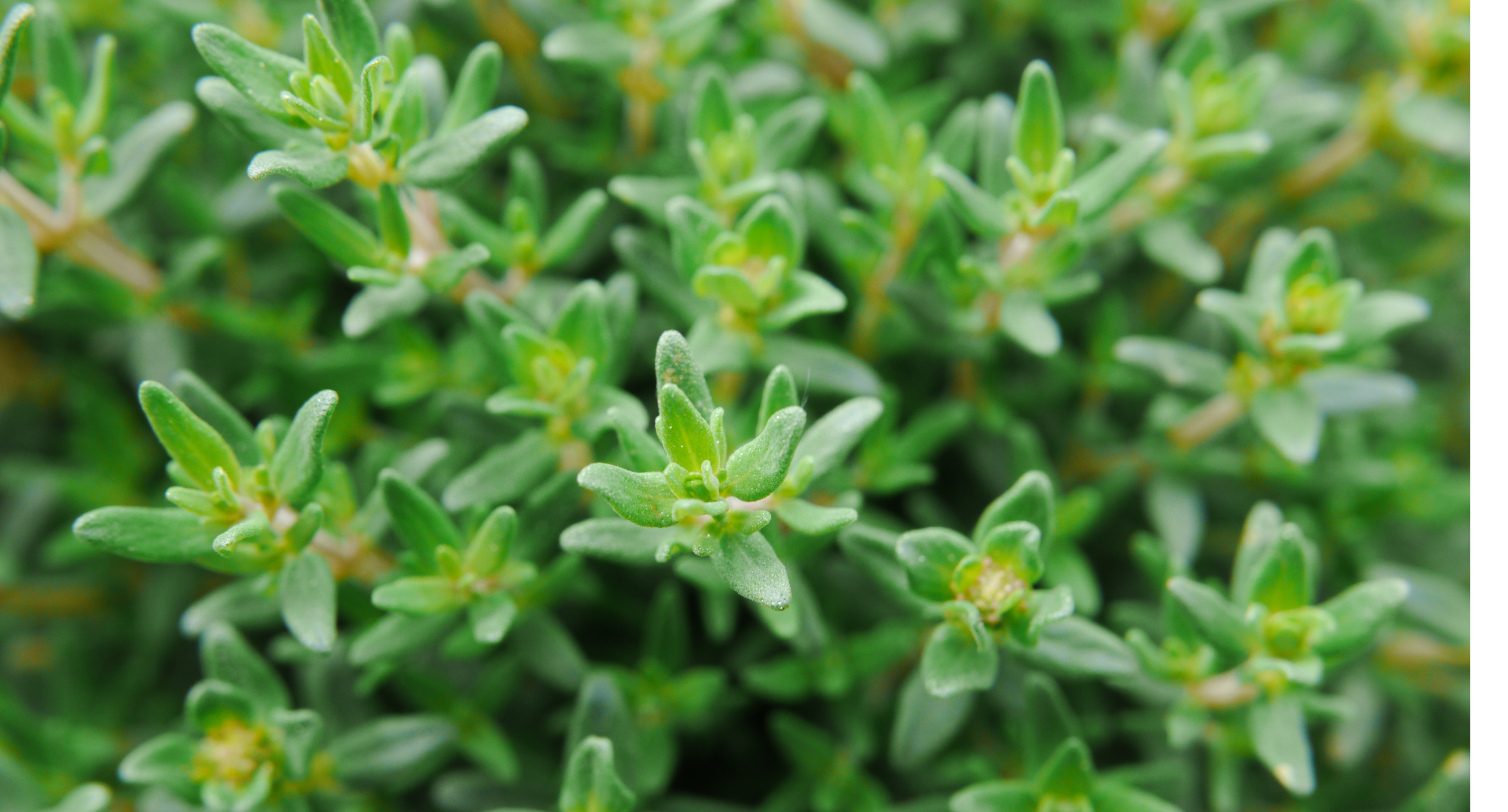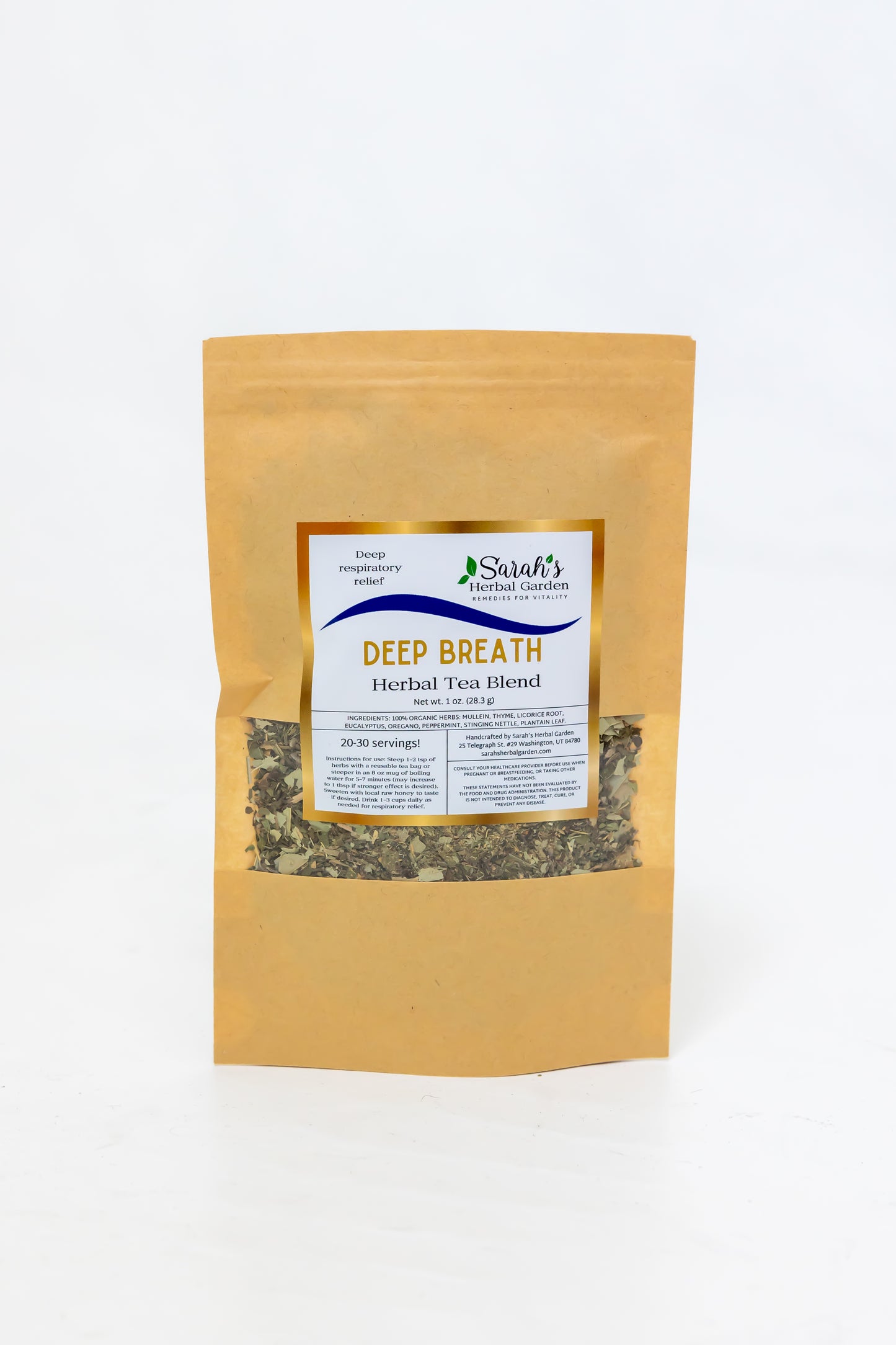
Thyme
Scientific Name: Thymus vulgaris
Herbal Profile of Thyme (Thymus vulgaris)
Botanical Name: Thymus vulgaris
Family: Lamiaceae (Mint family)
Common Names: Thyme, Common Thyme, Garden Thyme, Wild Thyme
Plant Description:
Thyme is a low-growing, perennial herb that forms small, bushy shrubs about 6 to 12 inches (15 to 30 cm) tall. It has small, aromatic, grey-green leaves and pink, purple, or white flowers that bloom in the summer. The plant thrives in well-drained soils and sunny conditions and is native to the Mediterranean region, where it grows wild. Thyme is widely cultivated for culinary, medicinal, and ornamental purposes.
Parts Used:
- Primary Part: Aerial parts (leaves, stems, and flowers)
- Secondary Part: Essential oil (extracted from leaves and flowers)
Geographical Distribution:
Thyme is native to Southern Europe and the Mediterranean region but is now cultivated worldwide in temperate climates. It is commonly grown in herb gardens and is found in dry, rocky soils or hillsides in its natural habitat.
Chemical Constituents:
Thyme contains several bioactive compounds, many of which contribute to its medicinal and culinary uses:
- Essential Oils: Thymol, carvacrol, linalool, borneol (thymol is the primary active compound with antiseptic properties)
- Flavonoids: Apigenin, luteolin, thymonin (with antioxidant properties)
- Rosmarinic Acid: A potent antioxidant with anti-inflammatory benefits
- Tannins: Astringent compounds that contribute to thyme’s medicinal uses
- Terpenes: Including alpha-pinene, which have antimicrobial and anti-inflammatory properties
Thymol, a key constituent of thyme’s essential oil, is responsible for many of its antiseptic, antifungal, and antibacterial properties.
Therapeutic Uses and Benefits:
- Respiratory Health:
Thyme is widely used to treat respiratory conditions such as bronchitis, coughs, asthma, and congestion. It acts as an expectorant, helping to loosen and expel mucus from the lungs and airways, making it useful for colds, coughs, and bronchitis. Thyme’s antiseptic and antibacterial properties also help combat respiratory infections. - Antimicrobial and Antifungal:
Thyme has powerful antimicrobial properties due to its high thymol content, making it effective against bacteria, fungi, and viruses. It can be used topically to treat fungal infections, like athlete’s foot, or to disinfect wounds. Internally, thyme can help fight infections like colds, flu, and sore throats. - Digestive Aid:
Thyme is a digestive herb, traditionally used to stimulate the appetite, support digestion, and relieve digestive discomforts such as gas, bloating, and cramping. It also has mild carminative properties, helping to reduce flatulence and ease stomach upset. - Immune System Support:
Thyme’s antioxidant, antimicrobial, and anti-inflammatory properties help support the immune system by protecting the body from infections and inflammation. It can help prevent colds, flu, and other common illnesses, while its vitamin C content provides additional immune-boosting benefits. - Skin Health:
Thyme is beneficial for treating skin conditions, including acne, eczema, and minor wounds. Its antimicrobial properties make it effective in treating infections and reducing inflammation in the skin. Thyme essential oil is often used in natural skincare products to cleanse and tone the skin. - Antioxidant Properties:
Thyme is rich in antioxidants, such as thymonin and luteolin, which help protect cells from oxidative stress and reduce the risk of chronic diseases associated with free radical damage, such as cardiovascular disease and cancer. - Anti-inflammatory Effects:
Thyme’s flavonoids and essential oils have anti-inflammatory properties, making it useful for reducing inflammation both internally and externally. It can help alleviate symptoms of inflammatory conditions such as arthritis and skin inflammation. - Oral Health:
Thymol, one of the main compounds in thyme, is a common ingredient in mouthwashes and toothpastes due to its antibacterial properties. Thyme helps reduce oral bacteria, prevent gum disease, and freshen breath. It can be used as a natural mouthwash or gargle to treat mouth sores or sore throats.
Preparation and Dosage:
Traditional Preparation:
Thyme is commonly used as a culinary herb in cooking, as a tea or infusion, or as an essential oil. It can be prepared as a tincture or syrup for respiratory conditions, and thyme essential oil is widely used for topical and aromatic applications.
Supplement Forms:
- Dried Herb: Used for teas, infusions, or culinary purposes.
- Essential Oil: Extracted from the leaves and flowers and used in aromatherapy or topically for infections and skin conditions.
- Tinctures: Alcohol-based extracts of thyme for internal use.
- Syrups: Thyme-based syrups for respiratory health, especially for treating coughs and bronchitis.
- Capsules/Tablets: Thyme extracts for internal supplementation.
Dosage:
- Tea/Infusion: Steep 1–2 teaspoons of dried thyme in 1 cup of boiling water for 10–15 minutes. Drink 2–3 cups daily to support respiratory and digestive health.
- Essential Oil (Topical Use): Dilute thyme essential oil with a carrier oil (such as olive or coconut oil) before applying to the skin. For respiratory conditions, thyme oil can be added to a steam inhalation.
- Tincture: 2–4 ml of thyme tincture (in a 1:5 ratio) taken up to three times daily.
- Syrup: 1–2 teaspoons of thyme syrup taken as needed to relieve coughs or throat irritation.
Potential Side Effects:
- Skin Irritation:
Thyme essential oil is very potent and can cause skin irritation or allergic reactions when applied topically without proper dilution. Always dilute thyme oil with a carrier oil before use. - Allergic Reactions:
People who are allergic to plants in the Lamiaceae (mint) family may experience allergic reactions to thyme, including skin rashes, respiratory discomfort, or digestive issues. - Pregnancy and Breastfeeding:
Thyme is considered safe in culinary amounts, but excessive use of thyme essential oil or supplements during pregnancy or breastfeeding should be avoided, as it may have uterine-stimulating effects. - Gastrointestinal Upset:
In large doses, thyme can cause digestive upset, including nausea, vomiting, or diarrhea.
Contraindications and Interactions:
- Pregnancy:
High doses of thyme, particularly in the form of essential oil or concentrated supplements, should be avoided during pregnancy due to the potential for uterine stimulation. Culinary amounts of thyme are generally considered safe. - Bleeding Disorders or Blood-Thinning Medications:
Thyme has mild blood-thinning effects and may increase the risk of bleeding in individuals taking anticoagulant medications or with bleeding disorders. - Allergies to Mint Family Plants:
Thyme belongs to the mint family, so individuals allergic to other plants in this family, such as basil, oregano, or lavender, should use caution when using thyme.
Traditional and Cultural Uses:
Thyme has a long history of medicinal and culinary use, dating back to ancient civilizations. The ancient Egyptians used thyme in embalming rituals due to its preservative properties, while the ancient Greeks and Romans used it in baths and as a fumigant to ward off illness. In medieval Europe, thyme was believed to offer protection from evil spirits, and it was commonly burned to purify the air. The herb was also used in traditional herbal medicine to treat coughs, colds, and digestive issues.
Today, thyme remains a staple in Mediterranean cuisine and is widely used in herbal medicine to treat respiratory and digestive ailments, as well as in natural skin care products.
Sustainability and Ethical Considerations:
Thyme is widely cultivated and is not at risk of overharvesting. It grows easily in a variety of climates, especially in well-drained soils with plenty of sunlight. When sourcing thyme essential oil or supplements, it’s important to choose organic and sustainably harvested products to ensure high quality and environmental responsibility.
Summary:
Thyme is a versatile herb known for its antimicrobial, respiratory, and digestive health benefits. It has been used for centuries to treat coughs, colds, infections, and digestive discomfort, while its essential oil is valued for its antiseptic properties. Rich in antioxidants and anti-inflammatory compounds, thyme supports immune health, respiratory function, and skin health. Though generally safe in culinary amounts, thyme essential oil should be used with caution due to its potency, especially during pregnancy or in individuals with allergies.
Sarah's Herbal Garden
Deep Breath {Respiratory Relief Herbal Tea Blend}
Share


